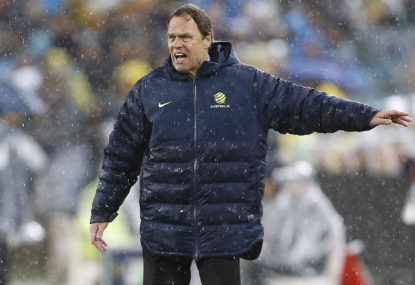Not before time and with still enough time to steady the ship before the World Cup, the FFA have bitten the bullet and sacked Holger Osieck after consecutive 6-0 defeats to Brazil and France.
This morning’s hiding by a motivated Le Bleus in Paris, coming after a similarly lifeless performance against the Selacao in Brasilia, left Frank Lowy and David Gallop with no choice.
It had to happen.
Despite qualifying the ‘Roos for a third consecutive World Cup, there can be no disputing that the team under Osieck’s guidance has been on a downward spiral, and for some time.
The slump in FIFA rankings certainly tells one tale, but it’s been the unacceptable performances and his inability to turn the team around and get it trending upwards that ultimately cost him his job.
For whatever reason, both Osieck and his predecessor Pim Verbeek were unable to rejuvenate the Socceroos, never truly showing the type of belief in our youngsters and mentality that Guus Hiddink did when he took over from Frank Farina in 2005.
There are many similarities in the decisions then and now. Essentially, they were both teams heading nowhere.
There were also signs nine or 10 months out from South Africa that Verbeek was struggling to regenerate his side.
Despite the odd question by this correspondent and a few others at the time, the FFA stuck with the Dutchman and ultimately suffered the 4-0 embarrassment against Germany.
This time Lowy wasn’t prepared to suffer the same fate, and rightly so.
“The decision is based on the longer term issues of the rejuvenation of the Socceroos team and the preparations for the World Cup and the Asian Cup,” he said.
“FFA has set a strategic objective of having a highly competitive team in Brazil and then handing over a team capable of winning the Asian Cup on home soil in January 2015.
“We have come to the conclusion that change is necessary to meet those objectives.”
Essentially, they have a couple of options.
The first involves going with someone like Guus Hiddink for the next eight months, knowing he won’t be afraid to make the tough calls or turn over the team, as he did in 2005.
Hiddink, or someone of his ilk, would essentially be here to not only refresh the team, but get them organised and competitive enough to make a mark in Brazil.
Due to the cost, there would be some expectation to balance the regeneration of the Socceroos with results at the World Cup.
But Hiddink would be here only for a short term, and hand over the team to a new manager, who would then have only six months to prepare for the home Asian Cup in January 2015.
Another position is to think of the World Cup and the Asian Cup as part of a longer strategic plan that involves the national team manager working to a process of bringing through our best talent to the national team.
Of course there will be pressure on that Socceroos manager to get results and be competitive, but the end goal wouldn’t be just about the results.
There would also be an evaluation of performance, playing style and whether the team is constantly moving forward.
Such a long-term plan may feature a desire to go with a homegrown manager.
In truth, it needn’t be so black or white, and we should always keep an an open mind about finding the best candidates.
But frankly, the technical work produced by the likes of Ange Postecoglou, Graham Arnold and Tony Popovic over the past few years of the A-League is light years ahead of anything produced by Osieck or Verbeek.
Postecoglou and Arnold, in particular, have served time in the national set, gone away and learnt from their errors, and have been producing consistently excellent work since.
What Postecoglou showed at the Brisbane Roar is that he isn’t afraid to come in, make the tough calls, and do things his way.
Essentially, his work involved turning over an aging team in a short period and instilling a confidence and template to play – just the type of job required here.
Arnold, too, has also had great success at building something over a longer term.
He takes a slightly more pragmatic or adaptable approach to finding football solutions than Postecoglou, and given the current shape of our playing roster, that would also be an option.
Either way, the aim wouldn’t be to turn our team into word beaters in eight month. It would be to turn the team over and find a template to make them competitive, and at least having a crack.
While they might not quite have the depth of talent coming through that Hiddink had at his disposal in 2005, between the likes of Robbie Kruse, Tom Rogic, Mat Leckie, Mat Ryan, Tommy Oar, Oliver Bozanic, James Holland and Mitch Langerak, there is enough of a base for a competitive unit, on the up.
Things can change very quickly in football, as we saw in 2005.
One of the disappointments under Verbeek and Osieck is that the Roos adopted a negative mentality and strategy to achieving their qualification.
It’s as if neither truly believed in the mentality or ability of their players.
By the time Verbeek woke up, after the 4-0 loss to Germany, it was too late. Osieck stubbornly refused to.
While it would have been better if the FFA had intervened earlier, this is a welcome move and breathes some life and hope back into the Socceroos.





























































































